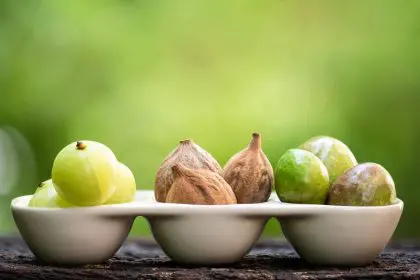Let’s talk about your heart for a second. You probably think you’re doing enough. Maybe you squeeze in some cardio, try to limit the bacon, and occasionally remember to take the stairs. But what if one of the most powerful heart health boosters was sitting quietly in the produce section, being completely overlooked?
That humble, fuzzy brown fruit with the vibrant green interior might be exactly what your cardiovascular system has been craving. Kiwi fruit doesn’t get nearly the attention of trendy avocados or Instagram-worthy berries, but its heart health benefits pack a surprisingly powerful punch.
The overlooked nutrient powerhouse hiding in plain sight
First, let’s appreciate what we’re working with. That small, unassuming kiwi delivers an impressive array of nutrients in a neat little 60-calorie package. We’re talking about more vitamin C than an orange, more potassium than a banana, and a fiber content that puts most fruits to shame.
But its heart health benefits go well beyond the basic nutritional stats. The unique combination of vitamins, minerals, antioxidants, and bioactive compounds in kiwi creates a synergistic effect that supports your cardiovascular system in multiple ways simultaneously.
The bright green flesh contains lutein, zeaxanthin, and other antioxidants that help prevent the oxidation of cholesterol. Why does this matter? When LDL cholesterol becomes oxidized, it’s much more likely to build up in your artery walls. By preventing this oxidation, kiwi helps keep your arteries clearer.
What’s even more impressive is how kiwi affects your blood pressure. Consistently eating kiwi has been linked to reductions in both systolic and diastolic blood pressure. This effect appears particularly pronounced in people who already have slightly elevated numbers, making it an excellent addition to a heart-healthy lifestyle.
The blood pressure breakthrough nobody’s talking about
The potassium in kiwi deserves special attention. This essential mineral works as a natural counterbalance to sodium in your body, helping relax blood vessel walls and increase sodium excretion through urine. The result? Lower blood pressure without medication.
Two kiwis provide about 430mg of potassium, making a significant contribution toward the recommended daily intake of 3,500-4,700mg. Most Americans only get about half the potassium they need, creating an imbalance that can drive blood pressure up over time.
But kiwi contains another blood pressure hero that gets even less attention. A unique type of natural acid in kiwi called quinic acid appears to have additional pressure-lowering effects that work through different mechanisms than potassium. This one-two punch makes kiwi particularly effective for maintaining healthy blood pressure.
The fiber content in kiwi further supports this effect. With both soluble and insoluble fiber, kiwi helps regulate cholesterol levels while supporting healthy weight maintenance, both crucial factors for optimal blood pressure.
The surprising clotting connection revealed
Perhaps the most fascinating cardiovascular benefit of kiwi involves its effects on blood platelets. These tiny cell fragments are essential for stopping bleeding when you’re injured, but when they become too sticky or aggregate too easily, they can form dangerous clots.
Kiwi contains compounds that help regulate platelet aggregation in a similar way to aspirin, but without the potential stomach irritation. Regular consumption has been shown to reduce platelet stickiness by up to 18% in some individuals, helping maintain healthy blood flow without increasing bleeding risk.
This doesn’t mean kiwi can replace prescribed blood thinners, but it does suggest that adding kiwi to your diet might provide additional cardiovascular protection through this mechanism. The effect appears strongest when kiwi is consumed regularly rather than occasionally.
The compounds responsible for this effect include actinidin, a unique enzyme found almost exclusively in kiwi. This enzyme not only helps with protein digestion but appears to interact with platelets in ways that promote healthy circulation throughout your body.
The inflammation fighter your arteries are begging for
Low-grade, chronic inflammation is increasingly recognized as a key driver of heart disease. It damages arterial walls, accelerates plaque formation, and makes existing plaques more vulnerable to rupture, potentially leading to heart attacks and strokes.
Kiwi contains a remarkable array of anti-inflammatory compounds that work through multiple pathways to cool this inflammation. The vitamin C content alone would make it valuable, but kiwi also provides flavonoids, carotenoids, and unique phenolic compounds that further reduce inflammatory markers.
When people consume kiwi regularly, researchers consistently observe reductions in C-reactive protein and other inflammatory markers associated with cardiovascular risk. These effects appear within weeks of adding kiwi to the diet and continue to improve with consistent consumption.
The fiber in kiwi plays a role here too, supporting a healthy gut microbiome. The connection between gut health and heart health grows clearer with each passing year, and the prebiotic fibers in kiwi feed beneficial bacteria that produce anti-inflammatory compounds that benefit your entire circulatory system.
How to actually enjoy this heart-saving fruit
Let’s be honest. Some “superfoods” require serious culinary commitment or taste bud adjustment. Fortunately, kiwi is deliciously accessible. The sweet-tart flavor profile works in multiple contexts, from breakfast to dessert.
The simplest approach is to cut a kiwi in half and scoop out the flesh with a spoon. Yes, you can eat the skin if it’s ripe and you wash it well, but most people prefer the flesh-only experience. For maximum benefit, aim for two kiwis daily, which happens to be the amount used in many of the successful heart health studies.
Beyond the basic spoon method, try slicing kiwi into your morning oatmeal or yogurt. The natural acidity brightens the flavor of these breakfast staples while the seeds add pleasant texture contrast. Kiwi also makes an excellent addition to smoothies, adding creaminess and tang without overwhelming other flavors.
For a refreshing snack, freeze peeled kiwi chunks for a few hours. The texture transforms into something similar to sorbet, perfect for satisfying sweet cravings without added sugar. Kiwi also pairs beautifully with dark chocolate, creating a flavor combination that feels indulgent while delivering heart-healthy antioxidants from both ingredients.
Timing matters more than you think
When you eat your kiwi can amplify its heart benefits. Consuming kiwi with iron-rich meals enhances iron absorption thanks to its high vitamin C content. This supports healthy red blood cell production and oxygen transport throughout your cardiovascular system.
Many people find eating kiwi about an hour before bed helps improve sleep quality, likely due to its natural content of serotonin and other sleep-regulating compounds. Better sleep means better heart health, as poor sleep is strongly linked to increased cardiovascular risk.
Eating kiwi after exercise appears to accelerate recovery and reduce exercise-induced oxidative stress. This makes it an excellent addition to your post-workout routine, supporting both your fitness goals and your heart health simultaneously.
The bottom line on kiwi and your heart
Small changes often yield the most sustainable results when it comes to health. Adding two kiwis to your daily routine represents exactly this kind of manageable adjustment with potentially significant benefits.
The cardiovascular advantages of kiwi don’t require major lifestyle overhauls or complicated protocols. Just consistent enjoyment of a delicious fruit that happens to contain a remarkable spectrum of heart-supporting nutrients.
In a world of conflicting nutrition advice and ever-changing recommendations, kiwi stands out for its research-backed benefits and straightforward incorporation into everyday eating. Your heart works tirelessly every second of your life. Perhaps it’s time to thank it with the fuzzy little fruit it’s been waiting for.
















